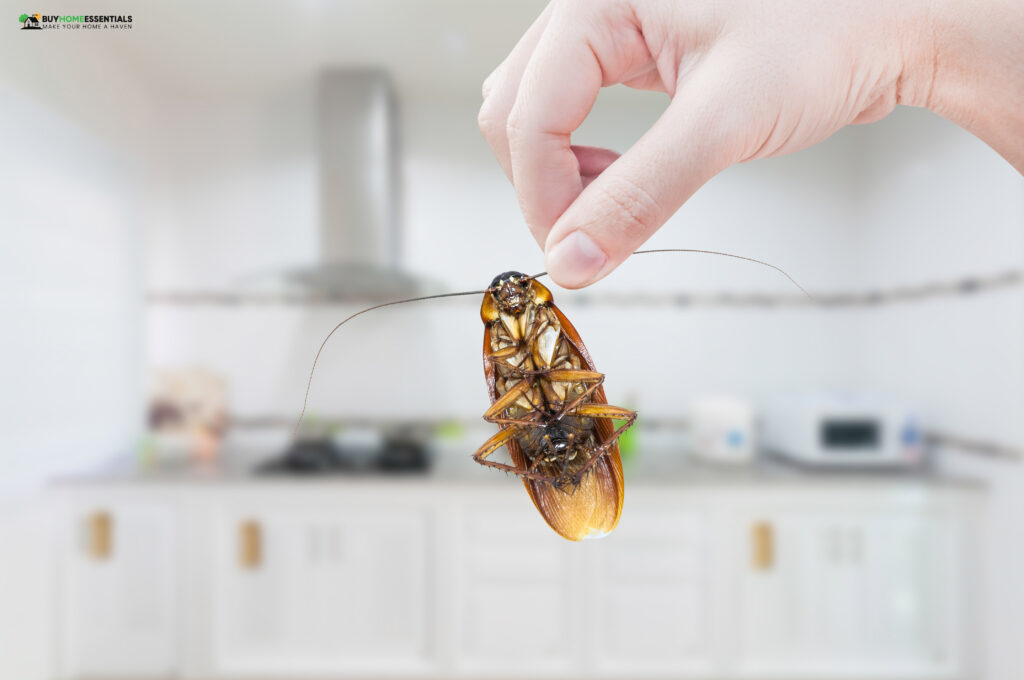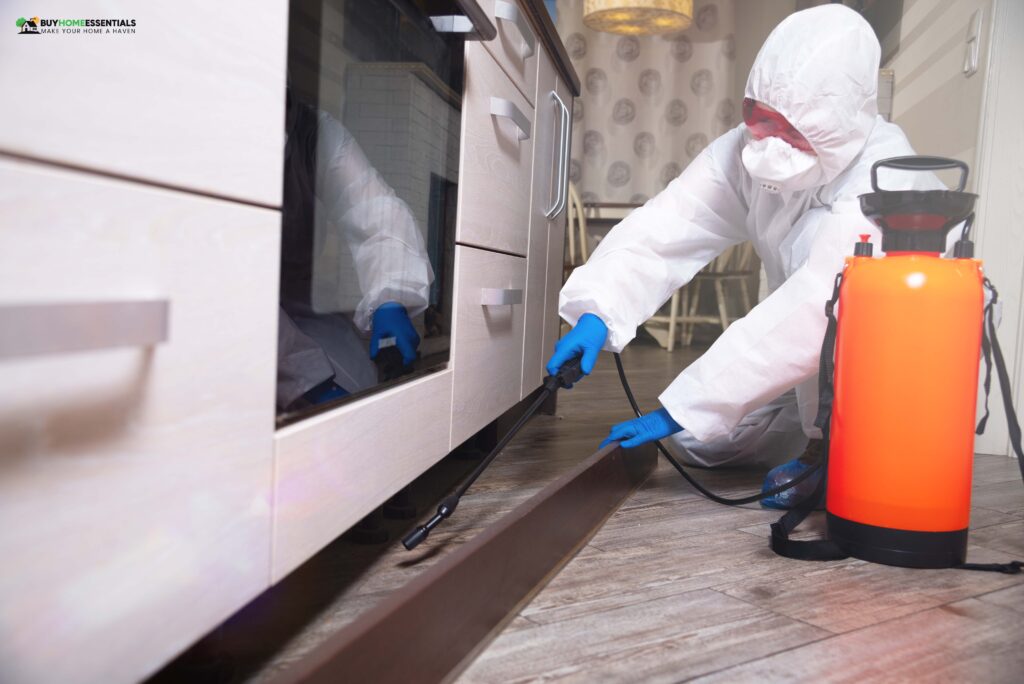Do you have cockroaches infesting your kitchen? Keeping a clean kitchen can’t guarantee that you’ll never encounter these persistent pests. You do not need to worry; we will explain in detail how to get rid of cockroaches in the kitchen.
Besides contaminating food and utensils, cockroaches are also dangerous for your health. Maintaining a sanitary living space requires tackling this issue head-on.
This article will reveal the secret to removing cockroaches in your kitchen. We’ve covered you whether you are looking for natural remedies or professional help. Let’s get started.
What Causes Cockroaches in the Kitchen

Despite their highly adaptable and resilient nature, cockroaches thrive in various environments, including our kitchens. Effectively tackling cockroach infestations means understanding what attracts and sustains them. Here are some possible causes of cockroach infestations in your kitchen.
1. Food Availability and Improper Storage
Food sources that are easily accessible attract cockroaches. Food leftovers on countertops, unsealed food containers, and even crumbs can be a feast for them. Keep food in airtight containers and quickly clean up spills and crumbs to reduce this attraction.
2. Damp and Humid Environment
Cockroaches thrive in humid and moist environments. Sinks, dishwashers, and inadequate ventilation can create a damp environment in kitchens. Keep sinks and countertops dry, fix leaks promptly, and ensure good ventilation to reduce humidity.
3. Cracks and Crevices
During the day, cockroaches prefer dark, tight places to hide. In the kitchen, cracks in the wall and gaps around pipes and electrical outlets make excellent hiding spots for them. Sealing these openings and doing thorough cleaning can keep cockroaches away.
4. Improper Waste Management
Undisposed garbage and food waste provide cockroaches with a feast. You can minimize this attraction by regularly emptying and cleaning trash cans, using sealed bins, and managing waste properly.
5. Lack of Regular Cleaning
Untidy environments with food residues and spills are perfect for cockroaches. Keeping your kitchen clean helps remove potential food sources and discourages cockroaches from nesting.
6. Poorly Sealed Entry Points
Small cracks and openings in walls, windows, and doors are easy entry points for cockroaches. Without proper sealing, these entry points are accessible for roaches to get in. By regularly inspecting and sealing these gaps, you can keep cockroaches out.
The key to effective cockroach control is understanding and addressing these causes.
Signs of Cockroach Infestation in the Kitchen
Detecting cockroach infestations early is crucial to prompt and effective intervention. As cockroaches tend to hide during the day, being vigilant about signs of their presence is essential. Here are some of the signs:
- Observing live roaches, especially at night, clearly indicates an infestation.
- A dark, coffee-like speck found in cockroach-infested areas indicates their activity.
- Small brown capsules called oothecae suggest nearby breeding populations.
- Cockroaches leave a musty smell that gets worse with infestation severity.
- Cockroaches leave gnaw marks on cardboard, papers, or wires.
- Cockroaches leave dark, irregular streaks on walls and surfaces due to their oily residue.
- Holes and gnaw marks on food packaging indicate cockroaches eat it.
- You may have cockroaches if you hear rustling or crackling sounds, especially at night.
How to Get Rid of Cockroaches in the Kitchen
The following guide will show you how to get rid of cockroaches in the kitchen permanently.
How to Get Rid of Cockroaches in the Kitchen: Home remedies
Using harsh chemicals to get rid of cockroaches in the kitchen is not always necessary. The following home remedies can effectively control and deter these pests while being safe for you and your family.
1. Baking Soda and Sugar Mixture
Mixing baking soda and sugar allows you to create a simple and effective mixture for controlling cockroaches. Mix baking soda and sugar in equal parts and sprinkle it in areas prone to cockroach activity. The sugar will attract cockroaches, while the baking soda disrupts their digestive system, causing them to die.
2. Diatomaceous Earth (DE)
Food-grade diatomaceous earth is a natural and abrasive option. Sprinkle a thin layer in areas where cockroaches hide or move. The DE abrades their exoskeleton and absorbs oils and fats, causing them to dehydrate and die.
3. Essential Oils
Cockroaches generally dislike essential oils such as peppermint, lavender, and eucalyptus. Add a few drops of each oil to water in a spray bottle and apply it around pest-infested areas. These oils have a strong scent, which serves as a natural deterrent.
4. Bay Leaves
Using bay leaves as a natural cockroach repellent is simple and effective. Then, store them in the pantry’s drawers, cabinets, and shelves. Its intense aroma repels cockroaches, keeping them away.
5. Vinegar Solution
Mix equal vinegar and water in a spray bottle to create a solution. You can use this solution to clean surfaces where cockroaches are commonly seen. Vinegar has a strong smell that repels cockroaches and discourages them from entering treated areas.
6. Cucumber Peels
Cockroaches have a natural aversion to the smell of cucumbers. You can use cucumber peels by placing them near entry points and hiding spots. The scent will deter cockroaches from entering those areas.
7. Boric Acid
The use of boric acid for cockroach control is widespread and highly effective. Mix boric acid with water to create a paste, then spray it on cockroach-infested areas. Boric acid acts as a stomach poison for cockroaches, ultimately eliminating them.
8. Neem Extracts
The natural insect repellent neem can effectively combat cockroach infestations in an eco-friendly way. You can create a solution using neem leaves or oil extracted from leaves with water. It can deter and repel them by spraying neem solution in areas of cockroach activity, such as dark corners or crevices.
Neem is a natural deterrent to cockroaches because of its unpleasant smell and taste. The regular use of neem extracts will keep roaches out of your kitchen.
Use these natural remedies to get rid of cockroaches forever and maintain good hygiene practices.
Related: How to Get Rid of Gnats in the Kitchen
Store-Bought Solutions for Cockroach Control
There are several store-bought solutions to get rid of cockroaches in the kitchen. Here are some solutions you might find helpful.
1. Cockroach Baits
Cockroach baits are popular and effective. These contain a poison that roaches eat and carry back to their nests, killing them all.
2. Cockroach Traps
Cockroach traps are a non-toxic way to capture and monitor roach activity. They use a strong adhesive to trap cockroaches, helping gauge the infestation level.
3. Cockroach Insecticides
There are different insecticides for cockroach control, like sprays, powders, and aerosols. The products are specially formulated to kill roaches on contact or by ingesting them.
4. Cockroach Repellents
Using repellents prevents cockroaches from entering treated areas. Typically, they contain strong scents that deter cockroaches from infesting a space.
5. Foam and Sealants
Foam and sealants fill cracks and crevices in which cockroaches can enter and hide. By sealing these openings, you eliminate roaches’ hiding places.
Seek for Professional Pest Control Services

Professional pest control services can help you deal with severe cockroach infestations in the kitchen. In addition to conducting thorough assessments, pest control experts design treatment plans and apply safe, targeted solutions.
Their services include follow-up inspections, preventive advice, and eco-friendly options. Professionals have the expertise and comprehensive approach needed to get rid of cockroaches.
Related: How to Get Rid of Ants in the Kitchen
FAQs
How do I get rid of roaches in my kitchen cabinets naturally?
Natural methods are safe and effective for removing cockroaches in your kitchen. The following steps will help you get a roach-free kitchen naturally:
- Clean the cabinets thoroughly with a mixture of water and mild soap.
- Apply food-grade diatomaceous earth (DE) along edges and corners to dehydrate and kill roaches.
- Create a solution using essential oils (peppermint, lavender, or eucalyptus) and water, then spray it inside the cabinets to repel roaches.
- Make a paste using boric acid and water, applying it in cracks and crevices to eliminate roaches (use sparingly with caution).
- Place bay leaves inside cabinets, as roaches dislike the smell.
- Seal any gaps or cracks in the cabinets to prevent roaches from entering.
- Keep your cabinets dry and clean, store food in airtight containers, and clean spills promptly.
- Regularly apply these natural methods to keep your kitchen cockroach-free.
Is it safe to use cockroach spray in the kitchen?
Yes, it is safe when used according to the instructions. Store it securely so that it does not come into contact with food. Rather than using chemical sprays for controlling cockroaches, consider natural alternatives such as diatomaceous earth or essential oils. Keep away from cooking areas, and ventilate the space if sprayed extensively to avoid nausea. Pest management should always prioritize safety.
The Takeaway
That’s all for today’s roundup on how to get rid of cockroaches in the kitchen. You can keep your kitchen cockroach-free with effective pest control methods and a commitment to cleanliness. Natural remedies like essential oils, boric acid, and diatomaceous earth are safe.
Following the instructions and ensuring proper ventilation are essential when using commercial sprays. You must take safety precautions when using insecticides, such as keeping food covered and out of sprayed areas.





